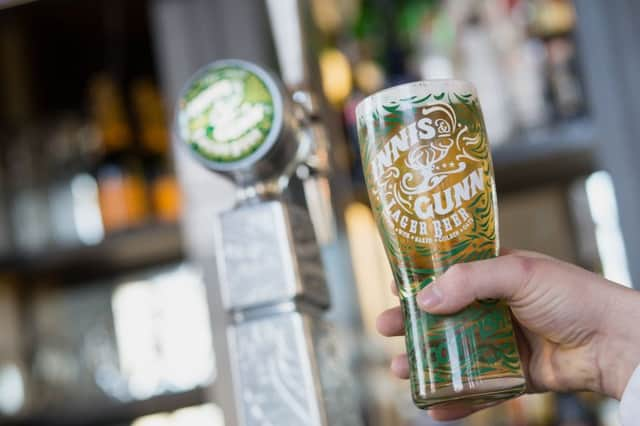Hidden dangers lie in dash for maxi rates on mini bonds


WITH interest rates of up to 8 per cent a year, it’s no surprise that “mini bonds” are catching the eye of long-suffering savers.
But as more new offers hit the shelves, they are being warned not to surrender to the temptation unless they know exactly what they’re letting themselves in for.
Advertisement
Hide AdAdvertisement
Hide AdFirms including John Lewis, the River Cottage food business and retailer Hotel Chocolat have raised millions from private investors in recent years by offering returns that have proved too attractive to resist at a time when interest rates are at rock-bottom.
One recent issue was from Scottish brewer Innis & Gunn, which has raised £2.5m from a four-year mini bond paying 7.25 per cent a year. It has extended the offer to 16 July following strong demand from investors, said Dougal Sharp, the firm’s chief executive.
“We’re learning as we go with the launch of this mini bond and the mix of applicants has been of real interest to us – we’ve attracted more than 840 individuals, from Innis & Gunn ‘fan-vestors’ to well-seasoned investors, predominantly in Scotland and southern England,” he said.
This month has also seen the issue of four-year mini bonds from Providence Bonds and coffee chain Grind, paying 7.5 per cent (a year) and 8 per cent (quarterly) respectively. The latter was issued through crowd-funding website Crowdcube, an increasingly popular approach for mini bond launches.
With such rates on offer, it’s no surprise they have been a hit with savers, said Amanda Downie, financial planner at Carbon Financial Partners.
“They can offer attractive returns with recent issues typically offering interest rates of between 6 and 8 per cent a year. During this time of low bank interest rates, these returns can understandably be very appealing.”
But, as ever, with eye-catching rates come significant risks. William Hunter, director of Edinburgh-based Hunter Wealth Management, said: “Mini bonds can be a huge risk for the investor. They are loans to the issuer, not shares in a company, so all you buy is high risk debt, often dressed up with discounted product vouchers.”
The Financial Conduct Authority (FCA) warned earlier this year that some firms promoting mini bonds weren’t making it sufficiently clear to investors that they could lose some or all of their capital. It added that the high failure rate of small businesses issuing mini bonds made it vital for investors to understand that they aren’t protected by the Financial Services Compensation Scheme (FSCS) in the event of the issuer going bust.
Advertisement
Hide AdAdvertisement
Hide Ad“Many consumers do not realise that they may not receive back their original investment if the firm runs into financial difficulty,” said Downie. “The firms offering these products are often small and the risk of failure is much higher than for a larger, financially stronger company.”
There are concerns too over retail bonds, issued by firms including Tesco and Nuffield Health in a bid to raise funds and into which savers have ploughed millions in recent years.
Retail and mini bonds may seem identical, but there are key differences. While retail bonds are tradable, which means they can be bought and sold on the order book for retail bonds (ORB), mini bonds must be held to maturity and so have less flexibility.
“Mini bonds are usually highly illiquid so you can’t get at your money during the term or even be able to sell them on to someone else,” said Hunter.
Mini bonds can also offer non-cash returns, such as services or products. The Innis & Gunn BeerBond, for instance, pays investors either 7.5 per cent cash or “beerbucks” that can be spent in the brewer’s online shop, while all investors in the bond get a 12.5 per cent discount in the store.
“If you are a fan of a certain type of beer brewery and you want to support them and benefit from beer discounts, then fair enough with a flutter, but they shouldn’t be seen as serious investments for the mainstay of your portfolio,” said Hunter.
But it’s the relaxed regulation of mini bonds that is perhaps the biggest difference for ordinary investors to be aware of. Greater scrutiny is paid during the issuing process to the structure and due diligence for retail bond launches than for mini bonds. The latter therefore have fewer regulatory hoops to jump through before being offered to ordinary investors, with implications for consumer protection.
Investors wanting access to the income paid by bonds can reduce the risk they take by instead using collective investments such as unit trusts and investment trusts, which also come with the protection of the FSCS.
Advertisement
Hide AdAdvertisement
Hide Ad“Collective investments offer much more diversification so investors do not stand to lose as much in the event of failure of a single company,” said Downie.
Hunter agreed: “If investors need more income they could be better off with a diversified portfolio of collectives that spread the risk. Fund managers only invest in well established companies paying a share of their profits to owners, otherwise known as dividends.”